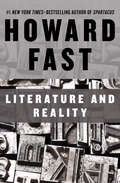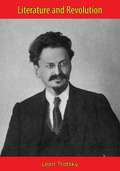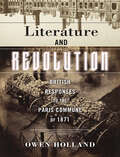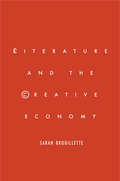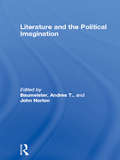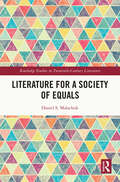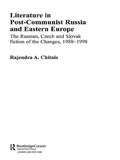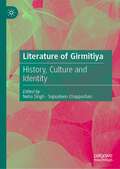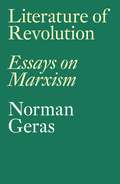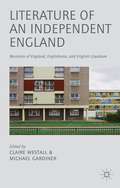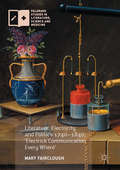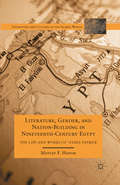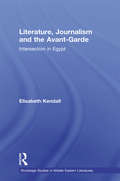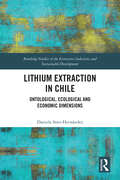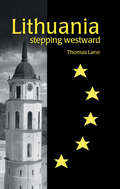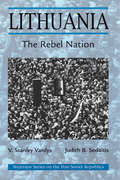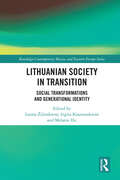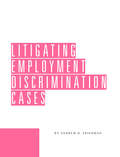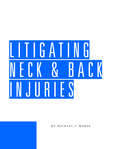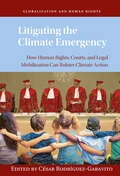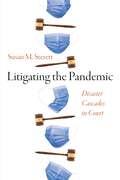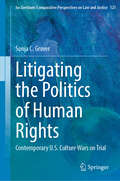- Table View
- List View
Literature and Reality
by Howard FastHoward Fast&’s controversial essay on the proper role of literature, offering insight into his life and worksIn this 1950 essay, Howard Fast argues that all writers have a duty to reflect the truth of the world in their works, particularly regarding social justice. Fast&’s treatise on literary criticism allows for a fuller understanding of his early novels, in which his political beliefs remain inseparable from his writing. Literature and Reality, which Fast wrote around the time of the 1949 Peekskill riots, offers a unique window into his worldview during the mid-twentieth century. This ebook features an illustrated biography of Howard Fast including rare photos from the author&’s estate.
Literature and Revolution [First Edition]
by Leon Trotsky Rose StrunskyLiterature and Revolution, written by the founder and commander of the Red Army, Leon Trotsky, in 1924 and first published in 1925, represents a compilation of essays that Trotsky drafted during the summers of 1922 and 1923.This book is a classic work of literary criticism from the Marxist standpoint. By discussing the various literary trends that were around in Russia between the revolutions of 1905 and 1917, Trotsky analyses the concrete forces in society, both progressive as well as reactionary, that helped shape the consciousness of writers at the time.In the book, Trotsky also explains that since the dawn of civilisation art had always borne the stamp of the ruling class and was primarily a vehicle that expressed its tastes and its sensibilities.“It is difficult to predict the extent of self-government which the man of the future may reach or the heights to which he may carry his technique. Social construction and psycho-physical self-education will become two aspects of one and the same process. All the arts—literature, drama, painting, music and architecture will lend this process beautiful form. More correctly, the shell in which the cultural construction and self-education of Communist man will be enclosed, will develop all the vital elements of contemporary art to the highest point. Man will become immeasurably stronger, wiser and subtler; his body will become more harmonized, his movements more rhythmic, his voice more musical. The forms of life will become dynamically dramatic. The average human type will rise to the heights of an Aristotle, a Goethe, or a Marx. And above this ridge new peaks will rise.”—Leon Trotsky
Literature and Revolution: British Responses to the Paris Commune of 1871 (Reinventions of the Paris Commune)
by Owen HollandBetween March and May 1871, the Parisian Communards fought for a revolutionary alternative to the status quo grounded in a vision of internationalism, radical democracy and economic justice for the working masses that cut across national borders. The eventual defeat and bloody suppression of the Commune resonated far beyond Paris. In Britain, the Commune provoked widespread and fierce condemnation, while its defenders constituted a small, but vocal, minority. The Commune evoked long-standing fears about the continental ‘spectre’ of revolution, not least because the Communards’ seizure of power represented an embryonic alternative to the bourgeois social order. This book examines how a heterogeneous group of authors in Britain responded to the Commune. In doing so, it provides the first full-length critical study of the reception and representation of the Commune in Britain during the closing decades of the nineteenth century, showing how discussions of the Commune functioned as a screen to project hope and fear, serving as a warning for some and an example to others. Writers considered in the book include John Ruskin, Edward Bulwer-Lytton, Eliza Lynn Linton, Mary Elizabeth Braddon, Anne Thackeray Ritchie, Margaret Oliphant, George Gissing, Henry James, William Morris, Alfred Austin and H.G. Wells. As the book shows, many, but not all, of these writers responded to the Commune with literary strategies that sought to stabilize bourgeois subjectivity in the wake of the traumatic shock of a revolutionary event. The book extends critical understanding of the Commune’s cultural afterlives and explores the relationship between literature and revolution.
Literature and the Creative Economy
by Sarah BrouilletteFor nearly twenty years, social scientists and policy makers have been highly interested in the idea of the creative economy. This book contends that mainstream considerations of the economic and social force of culture, including theories of the creative class and of cognitive and immaterial labor, are indebted to historic conceptions of the art of literary authorship. What's more, it shows how contemporary literature has been involved in and has responded to creative-economy phenomena, including the presentation of artists as models of contentedly flexible and self-managed work, the treatment of training in and exposure to art as a pathway to social inclusion, the use of culture and cultural institutions to increase property values, and support for cultural diversity as a means of growing cultural markets. Contemporary writers have not straightforwardly bemoaned these phenomena in a classic rejection of the instrumental application of art. Rather, they have tended to explore how their own critical capacities have become compatible with or even essential to a neoliberal economy that has embraced art's autonomous gestures as proof that authentic self-articulation and social engagement can and should occur within capitalism. Taking a sociological approach to literary criticism, Brouillette interprets major works of contemporary fiction by Monica Ali, Aravind Adiga, Daljit Nagra, and Ian McEwan alongside government policy, social science, and theoretical explorations of creative work and immaterial labor.
Literature and the Political Imagination
by John Horton Andrea T. BaumeisterThis volume shows how modern political theory can be enriched through an engagement with works of literature. It uses the resources of literature to explore issues such as nationalism, liberal philosophy, utopiansim, narrative and the role of theory in political thought.A variety of approaches are adopted and the aim is to show some of the many and diverse ways in which literature may enrich political theorising, as well as considering some of the problems to which this may give rise. The theorists discussed include Richard Rorty, Alasdair MacIntyre, Charles Taylor, and Martha Nussbaum. There are literary references from Greek tradegy, Jonathan Swift, Brian Moore, Elizabeth Bowen and contemporary feminist utopian fiction.All the contributors have a long-standing interest in the relations between literature and moral and political thought. They are concerned not to be restricted by conventional academic boundaries and are not united by any party-line or uniformity of intellectual commitments. This volume will be of great interest to all students engaged in the study of politics and literature.
Literature and the Politics of Post-Victorian Decadence
by Kristin MahoneyIn Literature and the Politics of Post-Victorian Decadence, Kristin Mahoney argues that the early twentieth century was a period in which the specters of the fin de siècle exercised a remarkable draw on the modern cultural imagination and troubled emergent avant-gardistes. These authors and artists refused to assimilate to the aesthetic and political ethos of the era, representing themselves instead as time travellers from the previous century for whom twentieth-century modernity was both baffling and disappointing. However, they did not turn entirely from the modern moment, but rather relied on decadent strategies to participate in conversations concerning the most highly vexed issues of the period including war, the rise of the Labour Party, the question of women's sexual freedom, and changing conceptions of sexual and gender identities.
Literature for a Society of Equals (Routledge Studies in Twentieth-Century Literature)
by Daniel S. MalachukLiterature for a Society of Equals defends modern equality and seeks its best literature. It accuses equality’s supposed friends on the left of attenuating this world-redefining relationship into a collection of rights and goods to distribute, secularizing it even as the right keeps sacralizing hierarchies, and optimistically handing it over to time to make it happen. In contrast, loyal to equality as modernity’s revolutionary invention, the writers examined here—from Mary Shelley to Gwendolyn Brooks to Ta-Nehisi Coates—envision "relational equality" as lately recovered by philosophers like Elizabeth Anderson and historians like Pierre Rosanvallon. Literary scholars need to reread these "pessimist egalitarians," too, though, for the discipline has failed them in the same three ways: i.e., attenuating and secularizing these writers’ portraits of equality but most of all insisting the sympathy generated by reading these texts will, with enough time, "expand the circle" of humanity. For students and teachers of literature at the university level, this volume is a guide to those writings that champion equality as relational, sacred, and ours—not time's—to realize.
Literature in Post-Communist Russia and Eastern Europe: The Russian, Czech and Slovak Fiction of the Changes 1988-98 (BASEES/Routledge Series on Russian and East European Studies)
by Rajendra Anand ChitnisThis book considers Russian, Czech and Slovak fiction in the late communist and early post-communist periods. It focuses on the most innovative trend to emerge in this period, on those writers who, during and after the collapse of communism, characterised themselves as 'liberators' of literature. It shows how these writers in their fiction and critical work reacted against the politicisation of literature by Marxist-Leninist and dissident ideologues, rejecting the conventional perception of literature as moral teacher, and redefining the nature and purpose of writing. The book demonstrates how this quest, enacted in the works of these writers, served for many critics and readers as a metaphor for the wider disorientation and crisis precipitated by the collapse of communism.
Literature of Girmitiya: History, Culture and Identity
by Neha Singh Sajaudeen ChapparbanThis book covers various forms of the production of girmitiya culture and literature. One of the main objectives is to conceptualize the idea of girmitya, girmitology, and girmitiya literature, culture, history, and identity in both colonial and postcolonial contexts. This book aims to document the history, experiences, culture, assimilation, and identity of girmitiya community. It also critically analyses the articulation, projection, and production of their experiences of migration and being immigrant, their narratives, tradition, culture, religion, and memory. It also explores how this labour community formulated into a diaspora community and reconnected/created the home (land) and continues to do so in the wake of globalization and Information and Communication Technology (ICT). This book is an attempt to bring the intriguing neglected diverse historical heritage of colonial labour migration and their narratives into the mainstream scholarly debates and discussions in the humanities and the social sciences through the trans- and interdisciplinary perspectives. This book assesses the routes of migration of old diaspora, and it explains the nuances of cultural change among the generations. Although, they have migrated centuries back, absorbed and assimilated, and got citizenships of respective countries of destinations but still their longing for roots, culture, identities, “home”, and the constant struggle is to retain connections with their homeland depicted in their cultural practices, arts, music, songs, folklore and literary manifestations.
Literature of Revolution: Essays on Marxism
by Norman GerasThis influential collection explores the pivotal texts and topics in the Marxist tradition. Ranging over questions of social theory, political theory, moral philosophy and literary criticism, it looks at the thought of Marx and Trotsky, Luxemburg, Lenin and Althusser. Included here are Geras’s influential and widely cited treatment of fetishism in Capital, his comprehensive review of debates on Marxism and justice, discussions on political organization, revolutionary mass action and party pluralism, and a novel analysis of the literary power of Trotsky’s writing.
Literature of an Independent England
by Michael Gardiner Claire WestallSome of the most incisive writers on the subject rethink the relationship between Britain, England and English literary culture. It is premised on the importance of devolution, the uncertainty of the British union, the place of English Literature within the union, and the need for England to become a self-determining literary nation.
Literature, Electricity and Politics 1740–1840: ‘Electrick Communication Every Where’ (Palgrave Studies in Literature, Science and Medicine)
by Mary FaircloughThis book investigates the science of electricity in the long eighteenth century and its textual life in literary and political writings. Electricity was celebrated as a symbol of enlightened progress, but its operation and its utility were unsettlingly obscure. As a result, debates about the nature of electricity dovetailed with discussions of the relation between body and soul, the nature of sexual attraction, the properties of revolutionary communication and the mysteries of vitality. This study explores the complex textual manifestations of electricity between 1740 and 1840, in which commentators describe it both as a material force and as a purely figurative one. The book analyses attempts by both elite and popular practitioners of electricity to elucidate the mysteries of electricity, and traces the figurative uses of electrical language in the works of writers including Mary Robinson, Edmund Burke, Erasmus Darwin, John Thelwall, Mary Shelley and Richard Carlile.
Literature, Ethics, and Decolonization in Postwar France
by Daniel JustAgainst the background of intellectual and political debates in France during the 1950s and 1960s, Daniel Just examines literary narratives and works of literary criticism arguing that these texts are more politically engaged than they may initially appear. As writings by Roland Barthes, Maurice Blanchot, Albert Camus, and Marguerite Duras show, seemingly disengaged literary principles - such as blankness, minimalism, silence, and indeterminateness - can be deployed to a number of potent political and ethical ends. At the time the main focus of this activism was the escalation of violence in colonial Algeria. The poetics formulated by these writers suggests that blankness, weakness, and withdrawal from action are not symptoms of impotence and political escapism in the face of historical events, but deliberate literary strategies aimed to neutralize the drive to dominate others that characterized the colonial project.
Literature, Gender, and Nation-Building in Nineteenth-Century Egypt
by Mervat F. HatemThis book examines how the process of nation-building in Egypt helped transform Egypt from an Ottoman province to an Arabic speaking national community. Through the discussion of the life and works of the prominent writer `A'isha Taymur, Hatem gives insight into how literature and the changing gender roles of women and men contributed to the definition and/or development of a sense of community.
Literature, Journalism and the Avant-Garde: Intersection in Egypt (Routledge Studies in Middle Eastern Literatures)
by Elisabeth KendallThe author explores the role of journalism in Egypt in effecting and promoting the development of modern Arabic literature from its inception in the mid-nineteenth century to the present day. Remapping the literary scene in Egypt over recent decades, Kendall focuses on the independent, frequently dissident, journals that were the real hotbed of innovative literary activity and which made a lasting impact by propelling Arabic literature into the post-modern era.
Lithium Extraction in Chile: Ontological, Ecological and Economic Dimensions (Routledge Studies of the Extractive Industries and Sustainable Development)
by Daniela Soto-HernándezThis book explores lithium extraction in Chile as part of the global energy transition, unravelling the ontological, ecological, and economic dimensions behind this type of extractivism.A transition away from fossil fuels is urgent in the context of climate change and one of the main challenges so far has been to store the variable energy provided by renewable energy sources. Due to its role in the lithium-ion batteries that power electric vehicles, lithium has been framed as a ‘critical mineral’ to transit towards low-carbon economies. Chile is the second lithium-exporting country worldwide and while it aims to expand its production, the delicate wetland ecosystems, and Indigenous territories where lithium comes from face increasing pressure. This book looks at the worlds, ecologies, and economies that are becoming increasingly extracted and the effects of these processes. Drawing on the case of extractivism in the Salar de Atacama watershed in the Antofagasta region in Chile and engaging with Indigenous and non-Indigenous local communities, NGOs, state officials, companies, and lithium workers through a twelve-month ethnography, the book offers a unique perspective into the contested narratives around what is being extracted and the manifold effects of it. By putting the Indigenous cosmovision forward and showing the local experiences with an industry powered by the ongoing energy transition, this book connects the notions of interconnection and fragmentation to provide a wider understanding of future challenges, where ontologies, ecologies, and economies are intertwined. The book weaves together different disciplinary strands and takes them forward to show how the solutions based on extractivism are menacing to destroy the marginalized worlds and ecosystems of human and non-human communities. As such, the book not only fills the gaps in current literature, but also goes further to rethink the ways in which academics engage with natural resources and how the pluriverse is currently experienced in the Salar de Atacama watershed.This book will be of great interest to academics, students, and environmental advocates studying energy transitions, critical minerals, anti-colonial and indigenous perspectives around development, and lithium extraction.
Lithuania: Stepping Westward (Postcommunist States and Nations #9)
by Thomas LaneLithuania restored her independence, after half a century of Soviet occupation, in the immediate aftermath of the failed Moscow coup in August 1991. As the multi-national Soviet state disintegrated, Lithuania evolved, without war or violence, from a communist state and a command economy to a liberal democracy, a free market, and a society guaranteeing human and minority rights. Lithuania therefore offers a notable example of peaceful transition, all the more impressive in the light of the bloody conflict elsewhere in the former Soviet Union of Yugoslavia, where the aspirations to independence of the constituent republics were either violently resisted or dissolved into inter-ethnic violence. Equally remarkable has been Lithuania's determination to 'return to Europe' after half a century of separation, even at the price of submerging its recently restored sovereign rights in the supranational European Union. The cost of membership in western economic and security organizations are judged to be worth paying to prevent Lithuania's being drawn once again into a putative Russian sphere of influence. On the threshold of a new millennium therefore, Lithuania has made a pragmatic accommodation to the demands of becoming a modern European state, whilst vigorously resisting the dilution of her rich cultural and historical traditions. These twin themes of accommodation and resistance are Lithuania's historical legacy to the current generations of Lithuanians as they integrate into European institutions and continue the modernization process.
Lithuania: The Rebel Nation
by V. Stanley VardysIn 1990, Lithuania became the first Soviet republic to break with the communist empire by declaring the restitution of political independence. Depicting a country at the crossroads of imperial designs, Vardys and Sedaitis trace the history, development, and ultimate triumph of the Lithuanian nation. In 1990, Lithuania became the first Soviet republic to break with the communist empire by declaring the restitution of political independence. Depicting a country at the crossroads of imperial designs, Vardys and Sedaitis trace the history, development, and ultimate triumph of the Lithuanian nation.They begin by exploring Lithuanias pagan ancestry and epochal struggles with Germanic and Russian states, with special emphasis on the first period of political independence between the two World Wars and on the effort to regain freedom in the wake of the perestroika reforms. The authors conclude by examining Lithuanias struggle with the legacy of Soviet rule as it strives to establish democracy and economic prosperity.
Lithuanian Social Democracy in Perspective, 1893–1914
by Leonas SabaliunasLithuanian Social Democracy in Perspective is the first book in any Western language on Lithuanian Social Democracy. In this work Leonas Sabaliunas studies the conflict between and convergence of socialism and nationalism in pre-1914 Lithuania. He analyzes the interplay of ideological priorities by observing the operations of Marxist political parties, emphasizing the origins, development, and achievements of the Social Democratic Party of Lithuania.But Sabaliunas also considers such partners and rivals as the Jewish Bund, the Polish Socialist Party, the Social Democracy of the Kingdom of Poland and Lithuania, and the Russian Social Democratic Labor Party. He focuses on the appearance of socialist parties at the local level, the politics of assertive behavior during the Russian Revolution of 1905-1906, the nature of interparty relations, and efforts to promote party unity. In particular, he investigates the projected relationship between Russia and its subject nationalities--a cardinal concern today as the Baltic peoples attempt to distance themselves from their Russian neighbors.Sabaliunas clarifies current massive Lithuanian opposition to Moscow and to its version of socialism. He stresses that in Lithuania the socialist movement from the beginning not only sought solutions to social and economic problems but also addressed issues of ethnic and national interest, especially the question of national sovereignty.
Lithuanian Society in Transition: Social Transformations and Generational Identity (Routledge Studies in the History of Russia and Eastern Europe)
by Melanie Ilic Laima Žilinskienė Sigita KraniauskienėLithuanian Society in Transition examines the life experiences formed during the process of post-socialist transformation in Lithuania by analysing the peculiarities of the life course of the cohort of young people born between 1980 and 2000. This book considers how various different components of post-Soviet system transformation and more recent events, such as the COVID-19 pandemic, determine youth experiences and how these experiences are reflected in the generations born between 1980 and 2000. It explores how far these generations see themselves as distinct generations with distinctive identities, how far any sense of a distinctive identity is based on political criteria or on technological changes, demography, and lifestyle and how far recent geopolitical events have had an impact on the identities of these younger generations. Drawing on detailed evidence from a corpus of specially commissioned life history interviews, the individual chapters uncover self-reflexive generational identities and set these in the broader context of both specific local generational identities and more global generation identifiers. Offering a rich analysis on social change in a key post-Soviet country following the collapse of communism, this book will be useful for researchers in sociology and social policy, history, Russia and Former Soviet Union, European studies and ethnic studies.
Litigating Employment Discrimination Cases
by Andrew FriedmanLitigating Employment Discrimination Cases Most employment discrimination books deliver black-letter law and omit strategies, pitfalls, and forms. Andrew H. Friedman's Litigating Employment Discrimination Cases takes a more practical approach. Focusing on evaluation, discovery, summary judgment, and mediation, this affordable strategic guide delivers proven tactics, pattern arguments, common mistakes, and model forms for experienced plaintiff and defense lawyers. The book's collection of over 180 forms includes: * Engagement letters * Complaints * Demand letters * Deposition outlines * Pattern interrogatories * Requests for production * Mediation briefs and letters * Settlement agreements * Juror questionnaires * Motions in limine Litigating Employment Discrimination Cases is packed with pattern arguments supported by thousands of recent cases with parentheticals and pinpoint citations, pleadings, motions, discovery documents, deposition outlines, pitfalls to avoid, and, most importantly, practice-proven tactics and techniques. Some of the areas covered include: Discovery * Defending employer's efforts to interview the plaintiff. * Controlling ancillary proceedings. Summary judgment * Summary judgment oriented deposition tips for employers. Pretrial * Common defense motions in limine, with extensive case authorities on stray remarks and me-too evidence. * Strategies and citations for opposing these defense motions.
Litigating Neck and Back Injuries
by Michael MorseTested Forms and Strategies for Proving Neck and Back Cases Soft tissue injury cases are plagued with challenges. The injury cannot be proven objectively with an X-ray, malingerers have tarnished the credibility of the entire claim category, and initial settlement offers can be pitifully low. As a result, these common claims will test your resourcefulness. Special techniques are required, and you can find them in Michael Morse's Litigating Neck & Back Injuries. His practical book is filled with creative strategies for making the injury more tangible, and model forms for improving your advocacy. Litigating Neck & Back Injuries explains in detail the medical and legal aspects of common neck and back injuries, focusing on how to win larger settlements with better discovery, negotiation and trial techniques. Maximize neck and back injury awards with this practical collection of battle-proven pleadings, discovery documents and questionnaires, practice checklists, demonstrative evidence, and novel techniques. This book-and-Digital Access package will help you: * Deal with skeptical insurance adjusters * Quantify pain and suffering * Estimate future lost wages * Win over the plaintiff's physician * Refute common defenses * Understand and explain medical test procedures * Challenge medical exam results * Depose and cross-examine medical experts * Depose and cross-examine the defendant * Overcome proof problems * And much more Prove what seems unprovable. Litigating Neck and Back Injuries will help you build a solid case of liability and damages. Some of the helpful information includes: Injury diagnosis and proof * 16 objective tests of the severity of soft tissue injuries. §1:300 * Checklists for determining sources of neck and back pain. §3:60 Settlement * A checklist of damage claims to consider in all neck and back injury cases. §1:230 * Tips for dealing with adjusters. §8:120 Pretrial * A table of causes of action correlated to likely defendants. §1:350 * Sample complaints. §1:360 Illustration Gallery The Illustration Gallery contains 90 anatomically accurate, illustrations of the head and spine, created by professional medical illustrator Chris Brown. Use these illustrations to help your treating physician document your client's injuries and/or blow them up for use at trial.
Litigating the Climate Emergency: How Human Rights, Courts, and Legal Mobilization Can Bolster Climate Action (Globalization and Human Rights)
by César Rodríguez-GaravitoLitigating the Pandemic: Disaster Cascades in Court (Critical Studies in Risk and Disaster)
by Susan M. SterettAs officials scrambled in 2020 to manage the spread of COVID, the reverberations of the crisis reached well beyond immediate public health concerns. The governance problems that emerged in the pandemic would be problems in other climate-related disasters, too.Many of these governance problems wound up in court. Businesses filed insurance claims for lost commerce; when the claims were denied, some companies sued. Defense attorneys tried to get inmates released from prison, citing dangerous living conditions. As state governments ordered closures and otherwise tried to adapt, interest organizations that had long sought to limit government authority challenged them in court. Political officials railed against litigation they argued would stop businesses from reopening. The United States, like other countries, governs partly through litigation, and litigation is one way of seeing the multiple governance failures during the pandemic.Drawing on databases of cases filed, news reports, and the websites of advocacy groups and law firms, Susan M. Sterett argues that governing during the pandemic, or in any disaster, must include the human institutions intertwined with the effects of the virus. Those institutions reveal problems well beyond the reach of technical expertise. Failures in private insurance as a way of governing risk, conflicts about the primacy of religion, government authority, and health, are problems that predated the pandemic and will persist in future disasters.
Litigating the Politics of Human Rights: Contemporary U.S. Culture Wars on Trial (Ius Gentium: Comparative Perspectives on Law and Justice #121)
by Sonja C. GroverThe cases analysed involve litigation concerning a disparate range of contemporary US culture wars including equity in access to public services unrestricted by religious bias, resistance to the teaching of historical facts relating to racial tensions in America including the so-called ‘critical race theory’ debate, the right of schoolchildren to exposure concerning a diversity of views, current USSC litigation about US university admissions policy that considers ‘race’ (ethnicity) as one factor amongst many in admission, contemporary cases concerning the constitutionality of US abortion law grounded on Roe v Wade and the scope of State and indigenous sovereign powers These contemporary culture war US landmark cases are then compared to similar cases in non-US jurisdictions and courts to consider in more depth the underlying core issues in these cases. The book highlights the risk to a democracy of recasting fundamental human rights litigation as essentially nothing more than the sorting out of political quagmires and cultural conflicts best left to the discretion of government rather than the courts. Then, the major risk is that constitutional controversies will increasingly not be decided by an independent judiciary but rather by self-interested politicians as the courts more often than not decline to weigh in on highly sensitive human rights controversies. A further risk is that instead such cases will be decided through a judicial majoritarian political lens rather than a largely apolitical consensus judicial opinion constructed by both philosophically left leaning (so-called liberal) and right leaning (so-called conservative) jurists.
